Youth in Trade: Unlocking the Potential of Africa’s Youth
By Divine Adongo | Voices of Africa

In Tamale, northern Ghana, a young woman named Mariam is packaging dried fruit snacks for online customers. In Kigali, a 23-year-old engineer is building solar-powered cold rooms for rural farmers. In Lagos, a digital fashion house is exporting Afrocentric wear to the diaspora via Instagram. These stories aren’t rare anymore — they are multiplying. Across Africa, youth are not waiting for jobs; they are creating them. They are not asking for permission; they are building platforms. The new face of African trade is young, bold, tech-enabled, and ready to go continental.
Africa’s youth population — the largest in the world — is often described as a ticking time bomb. But what if it’s our most powerful economic weapon? With over 70% of sub-Saharan Africa under the age of 30, the continent is sitting on an explosive reservoir of talent, creativity, and hustle. The question is not whether African youth are ready — they are. The real question is: Are we creating the systems that allow them to rise?
Today, most youth-run businesses operate within informal or micro-enterprise ecosystems. They face crippling barriers: lack of startup capital, outdated regulations, weak mentorship, and limited market access. Many are blocked at the borders of their own countries, unable to expand or scale because of red tape, trade restrictions, or the absence of cross-border financing. But this is where the African Continental Free Trade Area (AfCFTA) becomes a game changer.
AfCFTA is more than a trade agreement — it is a generational opportunity to unlock Africa’s youth potential. By removing tariffs, harmonizing standards, and facilitating the movement of goods, services, and people, AfCFTA can turn youth-led startups into continental brands. However, this vision cannot be realized through policies alone. It requires targeted empowerment, and that’s exactly where the AfCFTA Academy steps in.
The AfCFTA Academy is equipping young African entrepreneurs with the knowledge, skills, and networks to thrive under the new continental trade regime. Through hands-on training, mentorship programs, and digital resources, the Academy helps youth understand trade protocols, navigate export requirements, leverage digital platforms, and develop scalable business models. It demystifies AfCFTA and transforms it from a distant policy to a practical pathway for youth prosperity.
Youth in trade are not just participants — they are pioneers. From fashion designers in Dakar exporting to Accra, to agritech startups in Nairobi collaborating with partners in Lusaka, young Africans are already connecting the continent. They are using WhatsApp to close deals, Instagram to market products, mobile money to receive payments, and drones to deliver goods. They are bypassing borders with creativity and challenging outdated trade systems with innovation.
But for this movement to scale, governments must do their part. Business registration processes must be simplified. Border systems must be digitized. Youth-friendly financing must be expanded. National AfCFTA strategies must intentionally include and consult young entrepreneurs. If we design the continental market without youth in mind, we risk building an economy that ignores its most powerful engine.
For Pan-Africanists, this is not just an economic issue — it’s a legacy issue. The success of AfCFTA will be measured not by how many protocols are signed, but by how many youth-led businesses succeed because of it. The Academy is fostering a generation that understands trade law, defends its interests, and builds cross-border networks. They are not just doers — they are shapers of Africa’s economic future.
Mariam in Tamale should not dream of exporting to Europe before she can trade freely with Togo or Burkina Faso. Her first market should be African. Her growth should be powered by African systems. And her story — like many others — should be proof that youth in trade is not a risk to manage, but a force to unleash.
Because when Africa’s youth rise, Africa trades. And when Africa trades with itself, Africa wins.



